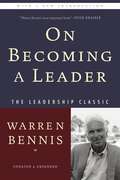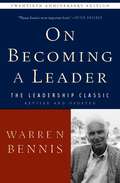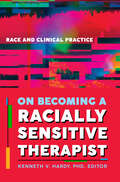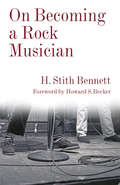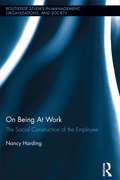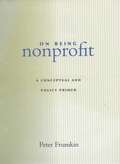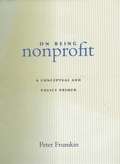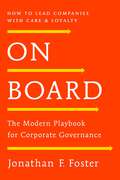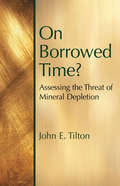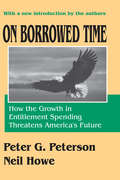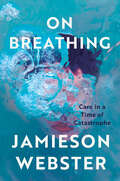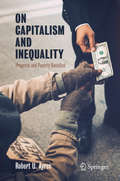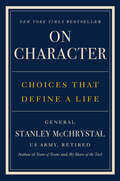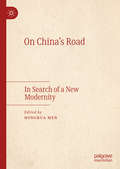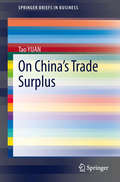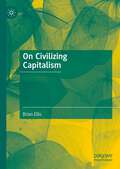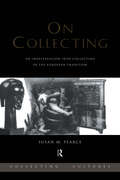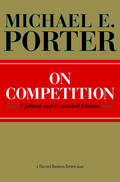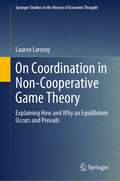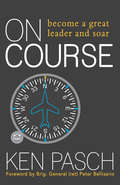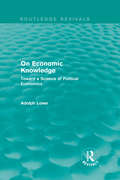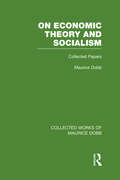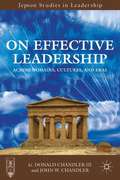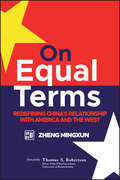- Table View
- List View
On Becoming a Leader
by Warren BennisDeemed "the dean of leadership gurus" by 'Forbes' magazine, Warren Bennis has for years persuasively argued that leaders are not born--they are made. Delving into the qualities that define leadership, the people who exemplify it, and the strategies that anyone can apply to achieve it, his classic work 'On Becoming a Leader' has served as a source of essential insight for countless readers. In a world increasingly defined by turbulence and uncertainty, the call to leadership is more urgent than ever. Featuring a provocative new introduction, this new edition will inspire a fresh generation of potential leaders to excellence.
On Becoming a Leader: A Workbook On Becoming A Leader
by Warren BennisDeemed "the dean of leadership gurus" by Forbes magazine, Warren Bennis has for years persuasively argued that leaders are not born-they are made. Delving into the qualities that define leadership, the people who exemplify it, and the strategies that anyone can apply to achieve it, his classic work On Becoming a Leader has served as a source of essential insight for countless readers. In a world increasingly defined by turbulence and uncertainty, the call to leadership is more urgent than ever.Featuring a provocative new introduction, this new edition will inspire a fresh generation of potential leaders to excellence.
On Becoming a Racially Sensitive Therapist: Race and Clinical Practice
by Kenneth V. HardyTransform your clinical practice by transforming yourself Claims of color blindness and the insistence that all clients are essentially the same have contributed to a dearth of knowledge and understanding regarding the delivery of racially sensitive treatment. For many clinicians, addressing issues of race in therapy mirrors the same discomfort that permeates most of our efforts to discuss it outside of treatment. Yet providing racially sensitive therapy, as well as possessing the clinical acumen to address complex issues of race and culture, is vital to competent contemporary practice. The volume is organized into three fundamental sections with contributions from mental health experts who have done the work to unlearn systemic biases about race and therapy. The first section introduces the concept of a racially sensitive therapist and what it means to become one. The second section focuses on cultural and racial storytelling to help uncover unknown parts of oneself and emphasizes racial self-examination, self-interrogation, and personal transformation. And the final section transports the reader from seeing and being to doing with racially informed intervention methods. A monumental undertaking, this book is an essential step for healers and caregivers to reframe the therapy process for all clients. Contributors include: Lane Arye, Vanessa Bing, Toby Bobes, Bonnie Cushing, Elana Katz, Niketa Kumar, Sharon RC Lee, Gloria Lopez-Henriquez, Yasmeen Rubidge, and Virginia Seewaldt.
On Becoming a Rock Musician (Legacy Editions)
by H. Stith BennettIn the 1960s and 1970s, becoming a rock musician was fundamentally different than playing other kinds of music. It was a learned rather than a taught skill. In On Becoming a Rock Musician, sociologist H. Stith Bennett observes what makes someone a rock musician and what persuades others to take him seriously in this role. The book explores how bands form; the backstage and onstage reality of playing in a band; how bands promote themselves and interact with audiences and music professionals like DJs; and the role of performance.
On Being At Work: The Social Construction of the Employee (Routledge Studies in Management, Organizations and Society #21)
by Nancy HardingInspired by the work of the philosopher Judith Butler, influenced by Marx’s theory of alienation and intrigued by theories of death, this book develops an anti-methodological approach to studying working lives. Distinctions are drawn between labour (the tasks we do in our jobs) and work (self-making activities that are carried out at the workplace): between the less than human, zombie-like laborer and the working human self. Nancy Harding argues that the experience of being at work is one in which the insistence on practising one’s humanity always provides a counter-point to organisational demands.
On Being Nonprofit: A Conceptual And Policy Primer
by Peter FrumkinThis concise and illuminating book provides a road map to the evolving conceptual and policy terrain of the nonprofit sector. Drawing on prominent economic, political, and sociological explanations of nonprofit activity, Peter Frumkin focuses on four important functions that have come to define nonprofit organizations. The author clarifies the debate over the underlying rationale for the nonprofit and voluntary sector's privileged position in America by examining how nonprofits deliver needed services, promote civic engagement, express values and faith, and channel entrepreneurial impulses. He also exposes the difficult policy questions that have emerged as the boundaries between the nonprofit, business, and government sectors have blurred. Focusing on nonprofits' growing dependence on public funding, tendency toward political polarization, often idiosyncratic missions, and increasing commercialism, Peter Frumkin argues that the long-term challenges facing nonprofit organizations will only be solved when they achieve greater balance among their four central functions. By probing foundational thinking as well as emergent ideas, the book is an essential guide for nonprofit novitiates and experts alike who want to understand the issues propelling public debate about the future of their sector. By virtue of its breadth and insight, Frumkin's book will be an invaluable resource for anyone interested in understanding the complex interplay of public purposes and private values that animate nonprofit organizations.
On Being Nonprofit: A Conceptual and Policy Primer
by Peter FrumkinThis concise and illuminating book provides a road map to the evolving conceptual and policy terrain of the nonprofit sector. Drawing on prominent economic, political, and sociological explanations of nonprofit activity, Peter Frumkin focuses on four important functions that have come to define nonprofit organizations. The author clarifies the debate over the underlying rationale for the nonprofit and voluntary sector's privileged position in America by examining how nonprofits deliver needed services, promote civic engagement, express values and faith, and channel entrepreneurial impulses. He also exposes the difficult policy questions that have emerged as the boundaries between the nonprofit, business, and government sectors have blurred. Focusing on nonprofits' growing dependence on public funding, tendency toward political polarization, often idiosyncratic missions, and increasing commercialism, Peter Frumkin argues that the long-term challenges facing nonprofit organizations will only be solved when they achieve greater balance among their four central functions. By probing foundational thinking as well as emergent ideas, the book is an essential guide for nonprofit novitiates and experts alike who want to understand the issues propelling public debate about the future of their sector. By virtue of its breadth and insight, Frumkin's book will be an invaluable resource for anyone interested in understanding the complex interplay of public purposes and private values that animate nonprofit organizations.
On Board: The Modern Playbook for Corporate Governance
by Jonathan FosterFor readers interested in board leadership and corporate finance, this book seamlessly blends real-world case studies with expert insights on corporate governance, leadership, and boardroom strategy, creating an essential business leadership book for CEOs, executives, board members, and corporate decision-makers.On Board: The Modern Playbook for Corporate Governance is the ultimate guide for corporate directors, executives, governance professionals, and students navigating today&’s fast-evolving business landscape. Written by a seasoned corporate director, investment banker, and expert witness in corporate litigation, this essential resource delivers a historical perpective, data-driven insights and stories from inside boardrooms on board leadership, fiduciary duties, CEO issues, regulatory compliance, and governance best practices. This playbook addresses key corporate governance challenges, including: - CEO-board dynamics, executive oversight, and leadership effectiveness - Mergers, acquisitions, and restructurings effectiveness - Institutional investors' influence, proxy battles, and governance trends - The growing impact of ESG (Environmental, Social, and Governance) initiatives - Crisis management, corporate risk mitigation, and regulatory adherence Featuring exclusive interviews with top executives, corporate attorneys, investment bankers, and industry leaders, this book provides real-world case studies, strategic frameworks, and actionable guidance to enhance board effectiveness, shareholder value, and corporate success. A must-read for board members, business leaders, governance professionals, and students, On Board is the definitive resource for mastering corporate governance, leadership, and boardroom strategy in today&’s complex business environment.
On Borrowed Time: Assessing the Threat of Mineral Depletion
by John E. TiltonThe sharp rise in mineral use has revived concern about scarcity. Economist John Tilton responds by analyzing recent trends in the consumption and availability of minerals that are most integral to the needs of modern civilization. He reminds readers that, if the arguments about scarcity sound familiar, it is because the story of minerals scarcity is almost as old as human history-and so too is substitution and technological innovation. The issue at hand is the unprecedented acceleration in exploitation and use. Given global population growth, rising living standards, and environmental concerns, how seriously should today?s society take the threat of mineral exhaustion? On Borrowed Time? provides general interest and student readers with an accessible framework for understanding scarcity. Tilton defines important concepts and explores the methods used to study mineral scarcity, including physical measures of known reserves and the total resource base, and economic measures, such as extraction and end-user costs. He notes the increasing emphasis on the social and environmental costs of mineral production and use, placing the scarcity debate in context of broader concerns about sustainability and equity. He adds a history of thought about scarcity, from Malthus and Ricardo to Harold Hotelling, Donella Meadows, to the present day.
On Borrowed Time: How the Growth in Entitlement Spending Threatens America's Future
by Neil HoweEntitlements represent one of the largest and fastest-growing portions of the federal budget. They are regarded as sacrosanct by lawmakers, yet many people see them as one of the greatest threats to the American Dream. This volume argues that by sacrificing the future in order to pay ever-larger federal benefits through programs such as Social Security, Medicare, and federal pensions, entitlement spending has become a crushing burden to American workers. Peterson and Howe destroy myths surrounding entitlement spending. They show that the bulk of it does not go to the poor. The majority of the elderly are not needy and dependent. Entitlement programs, not defense spending, consume the largest share of the federal budget. In short, we cannot balance the budget without reducing entitlement spending. In a country that demands critical investments--improving public education, alleviating poverty, increasing professional opportunity--growth in entitlement spending is unaffordable.On Borrowed Time is an important and timely book that will be mandatory reading for policymakers, politicians, economists, and a general public concerned with its financial future.
On Breathing: Care in a Time of Catastrophe
by Jamieson WebsterA gorgeous, expansive piece of narrative non-fiction about care, dependence, and what it means to breathe in an age of environmental catastropheA few moments after birth we begin to use our lungs for the first time. From then on, we must continue breathing for as long as we are alive. And although this mostly happens unconsciously, in a society plagued by anxiety, climate change, environmental racism, and illness, there are more and more instances that &“teach us about the privilege that is breathing.&” Why do we so easily forget the air that we breathe in common? What does it mean to breathe when the environment that sustains life now threatens it? And how can life continue to flourish under conditions that are increasingly toxic? To approach these questions, Jamieson Webster draws on psychoanalytic theory and reflects on her own experiences as an asthmatic teenager, a deep-sea diver, a palliative psychologist during COVID, a psychoanalyst attentive to the somatic, and a new mother. The result is a compassionate and timely exploration of air and breathing as a way to undo the pervasive myth of the individual by considering our dependence on invisible systems, on one another, and the way we have violently neglected this important aspect of life.
On CUE: The Quest for Optimal Customer Unit Economics
by Elie Ofek Barak Libai Eitan MullerStartups are often evaluated by how well they perform on unit economics, defined as the ratio of a customer's lifetime value (LTV) to acquisition costs (CAC). A common target for unit economics, advocated by many VCs and analysts, is 3:1 (i.e., LTV/CAC=3). While there is certainly appeal to having a relatively high unit economics - and it provides the firm with a guide on how much to expend on acquiring customers - it is not obvious whether this prescribed "rule of thumb" ratio is in the firm's best interest. This note analyzes the problem by exploring how a company should go about determining the optimal amount to expend on customer acquisition. The approach proposed, in effect, calls for maximizing customer equity (the sum of lifetime values gained from all customers that are acquired less the acquisition costs incurred) and takes into account that there are decreasing returns to marketing efforts. The resulting customer unit economics (referred to in this note as CUE for short) is shown to often be lower than 3:1 - suggesting that firms have more leeway to grow while at the same time being mindful of profits.
On Capitalism and Inequality: Progress and Poverty Revisited (Springer Praxis Bks.)
by Robert U. AyresCapitalism is under attack. Defenders say that capitalism has raised billions of people from poverty. But a central activity of capitalism today, Wall Street style, is speculation (gambling), using other people’s money, and privatizing the profits while socializing the debts. Skeptics argue that capitalism has redistributed the wealth of the planet in favor of a very few, meanwhile leaving the planet in bad shape and leaving billions of people out in the cold. Wealth is now extremely mal-distributed, opportunity is far from equal, and upward social mobility has declined significantly in recent decades. This book reviews the evidence and arguments pro and con in considerable detail.The evidence is mixed. The main virtue of capitalism is its emphasis on competition as a driver of innovation and, thus, of economic growth. It is true that economic growth has accelerated in recent centuries, and it is true that billions of people have been lifted from poverty. But it is not necessarily true that intense “winner take all” competition in the marketplace is the explanation for growth. Neoclassical economic theory posits that self-interest is the primary motive for all economic decisions, leaving little room for cooperation and even less for altruism. The theory applies to an unrealistic “model” of human behavior, known as Homo economicus or “economic man”, whose characteristic activity is buying or selling.The reason for using the adjective word “social” – as in socialism” or “social service” or “social democracy” -- is, essentially, to deny those postulates of standard economic theory. Real humans are not rational utility maximizers (whatever that is) and very often do things that are not in their own personal best interests. This can happen because other interests, such as family loyalty, professional, religious, or patriotic duty, may take precedence. Real people rarely behave like Homo economicus, who has rivals but no friends. He (or she) does not trust anyone, hence cannot cooperate with others, and can never create, or live in, a viable social system (or marriage). Yet social systems, ranging from families and tribes to firms, cities, and nations do (and must) exist or civilization cannot exist. A viable social system must not allow “winner takes all”. It must reallocate some of the societal wealth being created by competitive activities to support the young, the old and the weak, because all of those people have equal rights, if not the same luck or the same skills.Both competition and cooperation have important roles to play. A hybrid capitalism involving both is the only viable solution. The book ends with a specific suggestion, namely Universal Basic Income, or UBI.
On Character: Choices That Define a Life
by General Stanley McChrystalFrom the bestselling author of Team of Teams and My Share of the Task, reflections on character, and who we choose to be. &“Reputation is what men and women think of us; character is what God and angels know of us.&” —Thomas PaineHow to measure a life? After a career of service, retired four-star general Stanley McChrystal had much to contemplate. He pondered his successes and failures, his beliefs and aspirations, and asked himself, Who am I, really? And more importantly, who have I become? When I die, how will I be measured?In the end, McChrystal came to a conclusion as simple as it was profound: the reality of who we are cannot be recorded in dates or accomplishments. It is found in our character—the most accurate, and last full measure, of who we choose to be.On Character offers McChrystal&’s blueprint for living with purpose and integrity, challenging us to examine not just our deeds but who we become through them. Drawing from a lifetime of experience, he distills profound insights on setting and meeting standards, aligning actions with beliefs, and offers practical advice on overcoming obstacles and pursuing self-improvement.According to McChrystal, character is not a trait inherited at birth, nor does it automatically come from education, position, or experience. Character, instead, comes down to a succession of choices, most mundane, several momentous, that reveal the deep truth of our capacity for virtue.In an era where understanding and upholding our ideals is more crucial than ever, On Character offers an inspiring roadmap for personal growth and integrity—a call to become our best selves, both as individuals and as Americans.
On China's Road: In Search of a New Modernity
by Honghua MenThis book aims to delve deeper into China’s Road studies, bringing together China’s leading scholars from different disciplines to examine, with reference to the grand strategies of major powers in the world, the strategically important issues that China faces, the interactions between domestic politics and international politics, and the way in which China seeks to become a world player. The book contains articles analyzing the history and reality of China’s road, domestic and international foundations of China’s Road, and China’s Road and the world’s future. The authors also discuss the unique aspects of China’s Road, as the properties and the selection of the system, ideas, and development model all comprise an unalterable socialist direction, government-led market economic system, human-oriented core ideas, and gradual reform. With balanced and peaceful development, cooperation, and mutual benefits as outstanding characteristics, China’s Road will ensure that China continues to progress.
On China's Trade Surplus
by Tao YuanChina's trade surplus is an essential question, but there are many popular misconceptions about it, a fact that prompted the creation of this book, On China's Trade Surplus. It will help readers to understand the manner in which China's foreign trade and China's role in global trade have developed, and to how to benefit from trade with China. In this book, many hot topics are analyzed, such as: What promotes China's trade surplus? Why doesn't it have a trade deficit? What are the relations between trade frictions and China's trade surplus, and how can trade frictions be reduced? What is the deeper meaning of the U.S. trade deficit with China?
On Civilizing Capitalism
by Brian EllisThis book shows how modern political, economic and moral theory, including our ideas of liberty and individualism, are trapped in 17th century notions of intuitive reasoning and not informed by modern scientific understanding. Brian Ellis starts with a re-appraisal of the founding of the United Nations and the political and economic policies of the post-war reconstruction period. He then shows how this period, despite its many faults, embodied a philosophy more closely embedded in scientific realism than dominant theories of either left or right today. He goes on to develop this philosophy, meticulously, demolishing theories of Rawls, Nozick and others along the way. The result is a philosophy that investigates how a society actually works, supports evidence-based economics and can better enable human beings to flourish. It is a philosophy that can also accommodate the historical differences between societies and their different, but parallel, development strategies over time.
On Collecting: An Investigation into Collecting in the European Tradition
by Susan PearceOn Collecting examines the nature of collecting both in Europe and among people living within the European tradition elsewhere.Susan Pearce looks at the way we collect and what this tells us about ourselves and our society. She also explores the psychology of collecting: why do we bestow value on certain objects and how does this add meaning to our lives? Do men and women collect differently? How do we use objects to construct our identity?This book breaks new ground in its analysis of our relationship to the material world.
On Competition
by Michael E. PorterFor the past two decades, Michael Porter's work has towered over the field of competitive strategy. On Competition, Updated and Expanded Edition brings together more than a dozen of Porter's landmark articles from the Harvard Business Review. Five are new to this edition, including the 2008 update to his classic "The Five Competitive Forces That Shape Strategy," as well as new work on health care, philanthropy, corporate social responsibility, and CEO leadership. This collection captures Porter's unique ability to bridge theory and practice. Each of the articles has not only shaped thinking, but also redefined the work of practitioners in its respective field. In an insightful new introduction, Porter relates each article to the whole of his thinking about competition and value creation, and traces how that thinking has deepened over time.This collection is organized by topic, allowing the reader easy access to the wide range of Porter's work. Parts I and II present the frameworks for which Porter is best known--frameworks that address how companies, as well as nations and regions, gain and sustain competitive advantage. Part III shows how strategic thinking can address society's most pressing challenges, from environmental sustainability to improving health-care delivery. Part IV explores how both nonprofits and corporations can create value for society more effectively by applying strategy principles to philanthropy. Part V explores the link between strategy and leadership.
On Coordination in Non-Cooperative Game Theory: Explaining How and Why an Equilibrium Occurs and Prevails (Springer Studies in the History of Economic Thought)
by Lauren LarrouyBy offering a critical assessment of the evolution of standard game theory, this book argues for a shift in the ontology and methodology of game theory for appraising games, one based on understanding the players’ strategic reasoning process. Analyzing the history of economic thought, the book highlights the methodological issues faced by standard game theory in its treatment of strategic reasoning and the consequence it has on the status of players’ beliefs. It also highlights how the two original contributions of T. C. Schelling and M. Bacharach can be applied to these issues. Furthermore, the book assesses the intersubjective dimension in games by applying the cognitive sciences and by integrating simulation theory into game theory. Consequently, this book offers an interdisciplinary approach for reassessing the nature of the intersubjectivity involved in strategic reasoning. It shows that the analysis of games should involve the study and identification of the reasoning process that leads the players to a specific outcome, i.e., to a specific solution. A game should not be understood (as is done in standard game theory) as a mathematical representation of an individual choice at equilibrium. This requires investigating the players’ capacity for coordination. Understanding the process of coordination allows us to understand strategic reasoning and ultimately to provide new answers to the indeterminacy problem, one of the central hurdles in game theory, and one that underscores its normative difficulties.
On Course: Become a Great Leader and Soar
by Ken PaschHave you ever had a bad boss? Do you think so many bosses are bad because they&’re &“jerks&” or because they just don&’t know HOW to lead? Bottom line, there are some jerks out there, but Ken Pasch&’s research shows that most bosses are frustrated because they just don&’t know how to lead. That frustration leads to some very bad relationships and outcomes. On Course helps begin turn this around. Unlike so many other books that tell professionals what a good leader should be, On Course is the first step in learning how to become a good leader. The revolutionary model business professionals learn is the result of Ken&’s transition from being one of those bad bosses, years ago, to becoming a successful leader. Don&’t take Ken&’s word for it, listen to the testimonials from others. Then, dive into On Course to discover how you, too, can become a great leader and soar!
On Economic Knowledge: Toward a Science of Political Economics (Routledge Revivals Ser.)
by Adolph LoweThis book, first published in 1965 with a revised edition in 1977, examines the subject matter and the method of the science of economics. On Economic Knowledge explores the historical trends of economics, the logic of economic science, and whether or not economics can be viewed in itself as a science. This title will be of interest to students of economics.
On Economic Theory & Socialism: Collected Papers
by Maurice DobbThis volume collects published papers and essays from widely scattered and inaccessible sources, some of which appeared for the first time when this book was originally published. In the first part of the book the subjects range from the theory of wages and recent trends in economic theory to economists’ criticism of capitalism and socialism, investment-policy in under-developed countries, and economic growth under the Soviet Five Year Plans. The second part includes papers on Lenin and Marx, a study of the economic ideas of Bernard Shaw, and an essay on historical materialism.
On Effective Leadership: Across Domains, Cultures, And Eras (Jepson Studies In Leadership)
by G. Donald Chandler John W. Chandler IiiUsing case studies from a wide range of fields and historical settings, On Effective Leadership seeks to explain why some leaders are effective, why many are not, and why only a very few are exceptional.
On Equal Terms: Redefining China's Relationship with America and the West
by Mingxun ZhengAn insightful look at the future of China's relations with the West and the United States For anyone who wants to better understand China and its economic and political relations to the West, On Equal Terms offers front-row insight. Exploring China's state-capitalist economic model and the unique qualities and ideals of Chinese culture that can make difficult for Westerners to understand its approach to business interactions, the book looks to the future, explaining how China and the United States can cooperate to solve some of the world's major problems. Covering the extraordinary changes taking place in China and China's relationship with America and the West over ten powerful chapters, the book looks at China's state-capitalist model of governance, how history affects her behavior in foreign policy, how China is emerging as an economic world power, that products are not made but assembled in China, that China is not one big market but many markets, and much more. Provides an inside view on the future of China and America from an expert with personal experience on both sides of the story Explains the sometimes mysterious worlds of "Guanxi" and "Mianzi"—the notions of giving, saving, and preserving "face" in business and cultural relationships that many Westerners struggle to understand A truly up-to-date resource that gives reader's the most recent information about Chinese-American relations China and America need to cooperate in order to solve the major problems of the world, and On Equal Terms gives readers the information they need to improve their business and professional relationships in China.
